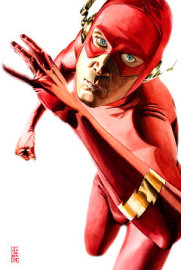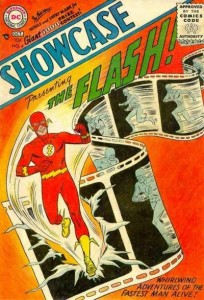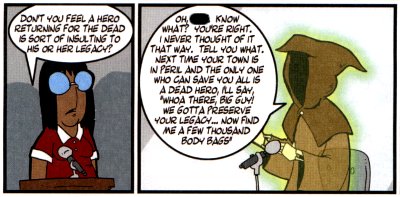 Spotted this article on Sony’s planned Flash Gordon movie: ‘Flash Gordon’ pace quickens with scribes. It opens with the tagline, “‘Flash Gordon’ is moving ahead at breakneck speed.” Those are odd comments for an ordinary guy who ends up having adventures in space, but appropriate for a super-speedster…. Yeah. Someone else got the Flash and Flash Gordon confused. It’s a typical example of what TV Tropes calls Cowboy Bebop at his Computer.
Spotted this article on Sony’s planned Flash Gordon movie: ‘Flash Gordon’ pace quickens with scribes. It opens with the tagline, “‘Flash Gordon’ is moving ahead at breakneck speed.” Those are odd comments for an ordinary guy who ends up having adventures in space, but appropriate for a super-speedster…. Yeah. Someone else got the Flash and Flash Gordon confused. It’s a typical example of what TV Tropes calls Cowboy Bebop at his Computer.
 It fits with society’s general contempt for both comic books and science-fiction. If you ask whether a football team is playing in the World Series, people will look at you like you’re an idiot. But it’s okay to get Star Wars and Star Trek mixed up to the point where Dr. Spock has a lightsaber and Yoda says, “Live long and prosper.” In fact, many people look down on you if you do understand the difference.
It fits with society’s general contempt for both comic books and science-fiction. If you ask whether a football team is playing in the World Series, people will look at you like you’re an idiot. But it’s okay to get Star Wars and Star Trek mixed up to the point where Dr. Spock has a lightsaber and Yoda says, “Live long and prosper.” In fact, many people look down on you if you do understand the difference.
Oddly, our mainstream culture is quite willing to go see science-fiction and comic-book films, as long as they have enough explosions. Take a look at the 30 top-grossing films list, and it’s one sci-fi, fantasy, or super-hero after another. (Exceptions: Titanic, Passion of the Christ, and Forrest Gump. I’m counting movies with talking animals as “fantasy.”) I guess it’s okay to watch the stuff, as long as you don’t remember too much about it afterward.
It also fits with the annoying tendency of headline writers to use the “Holy XYZ!” phrasing from the 1960s Batman TV show as if it’s somehow still relevant to modern-day comics or movies, despite a massive cultural shift away from camp and toward serious (and, in many cases, downright dark) storytelling over the past 20 years. That second link lists almost 50 examples from July alone!
I guess actually paying attention to what they write about would make them less cool or something.

 According to the
According to the 

